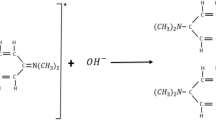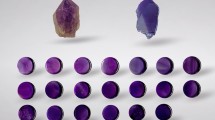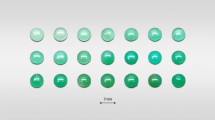Abstract
THE absorption spectrum of blue rock salt from Stassfurt was determined photo-electrically in the natural state and after heating for a certain time at various temperatures. The spectrum shows the well-known high maximum at 653 mµ and the smaller one at 535 mµ. On increasing the time of heating, the first maximum begins to shift towards shorter wave-lengths; its intensity increases at first and then decreases. The second maximum does not alter its position; it decreases immediately and disappears sooner than the first. The violet salt from the Grimberg mine in the Werra valley behaves quite differently. It shows only one maximum, at 583 mµ, which is not displaced after heating, and begins to decrease immediately.
This is a preview of subscription content, access via your institution
Access options
Subscribe to this journal
Receive 51 print issues and online access
$199.00 per year
only $3.90 per issue
Buy this article
- Purchase on Springer Link
- Instant access to full article PDF
Prices may be subject to local taxes which are calculated during checkout
Similar content being viewed by others
References
Przibram, K., Wien. Ber., IIa, 138, 483 (1929).
Seitz, F., Rev. Mod. Phys., 18, 384 (1946).
Author information
Authors and Affiliations
Rights and permissions
About this article
Cite this article
ADLER, N. Decoloration and the Ultramicroscopic Behaviour of Natural Blue and Violet Rock Salt. Nature 163, 989–990 (1949). https://doi.org/10.1038/163989c0
Issue Date:
DOI: https://doi.org/10.1038/163989c0
Comments
By submitting a comment you agree to abide by our Terms and Community Guidelines. If you find something abusive or that does not comply with our terms or guidelines please flag it as inappropriate.



